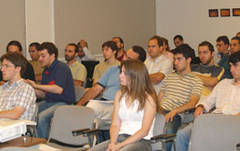INESC Porto organizes 4th RTCM Seminar
INESC Porto organized the 4th Seminar of the Rede Temática de Comunicações Móveis – RTCM (Mobile Communications Thematic Network) last July 21, which took place in the auditorium with over 50 participants.
16th November 2006
RTCM is made of R&D centres and companies with interests in the area of networks and mobile communications. The main objectives are promoting the exchange of knowledge and experiences between their researchers; fomenting the effective cooperation between their members and build shared visions of strategic national development. This group addresses a number of themes related with 4G networks and environment networks.
The 4G networks assume that a portable terminal should always be “well connected” to the network. This means a terminal can own multiple network interfaces of different radio technologies which will be used according to the users’ needs in an automatic and eventually, in a simultaneous way. This kind of networks also implies that the information is transported under the form of data packages.
The problems associated to the 4G networks include the mobility support, the traffic routing, the supply of quality of service including the management of radio resources, the safety and the traffic account. Ad-hoc networks and mobile networks are considered. The aspects related to planning, management and operation of this kind of networks will also be highly relevant.
The environment networks support a designated concept of environment intelligence, under the point of view of communications. Environment intelligence represents a vision of the future in which people are involved in environments which are sensitive and react to their presence. It is assumed that people carry small devices that are embedded in their clothes or body and communicate among themselves through personal networks.
The latter, made of radio connections, should establish relations of communication with the involving networks that include composition, safety and mobility aspects. New paradigms of communication, for example networks with indirections, can also be framed here.
The seminar had the special participation of two guests: Pedro Estrela and Professor Lajos Hanzo <http://www-mobile.ecs.soton.ac.uk/comms/_private/Lajos.htm> supported by IEEE Vehicular Technology Society Portugal Chapter.
The Telecommunications and Multimedia Unit (UTM) presented some of its works in the areas of Quality of Service in wireless networks and of congestion control in shared environments.
BIP July 2006


